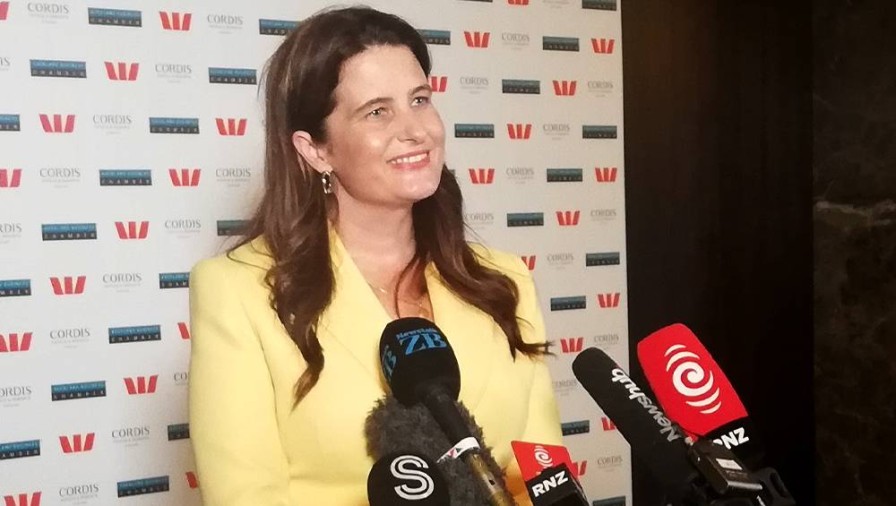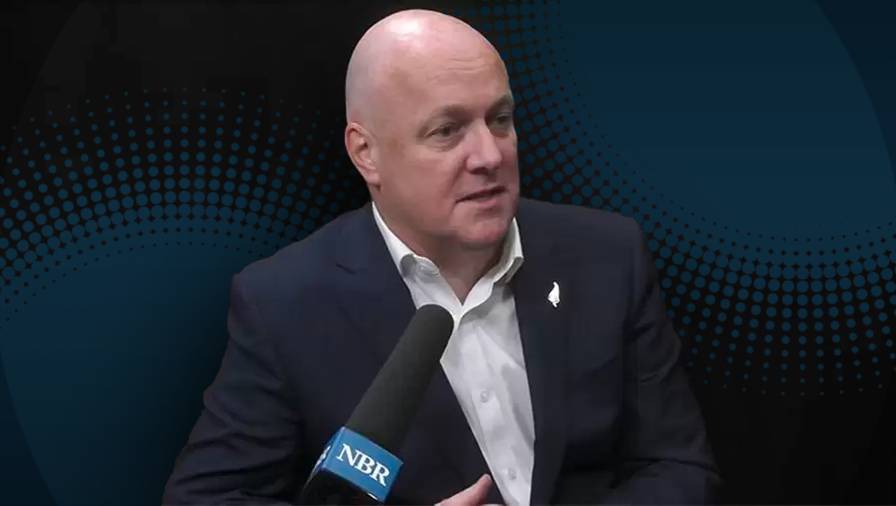

Sinking, fast track list, OCR cut, dismal finances, India
Release of the fast-track list has prompted a new wave of opposition to the Government’s plan.
WATCH: NBR political editor Brent Edwards speaks with Simon Shepherd.


Release of the fast-track list has prompted a new wave of opposition to the Government’s plan.
WATCH: NBR political editor Brent Edwards speaks with Simon Shepherd.
Losing the naval vessel Manawanui off the coast of Samoa last weekend was not a great start to the week for the Government.
The vessel now lies in about 30 metres of water, with concerns about how it might pollute the reef, coastline, and surrounding sea. The Defence Force has already convened a court of inquiry to determine the cause of the sinking.
Chief of Navy Rear Admiral Garin Golding said that, given public interest in the sinking, he would make the report public to the maximum extent possible consistent with the Privacy Act and his obligations to uphold national security.
Meanwhile, steps need to be taken to limit the environmental damage from the sinking. RNZ reported New Zealand’s deputy chief of navy saying no oil was leaking from the vessel, but divers from Samoa’s Marine Pollution Advisory Committee have confirmed diesel is leaking into the ocean.
Defence Minister Judith Collins has said the environmental impact was the Government’s main focus, as well as the salvage operation. But there are questions about how feasible it will be to salvage the vessel.
The day the Manawanui sank, the Government also released the 149 projects on the fast-track list. These will be put in the schedule to the Fast-track Approvals Bill and once, that becomes law, they will be able to apply for consents under the fast-track regime.

Defence Minister Judith Collins.
Release of the list – which has long been contentious because submitters on the bill did not know what projects were in line for fast-track consideration – has prompted a new wave of opposition. While many of the projects are not controversial, the list contains 11 mining projects and some projects that have already been declined under the existing planning process.
RMA Reform and Infrastructure Minister Chris Bishop says part of the purpose of the legislation is to make it easier for projects to get approval.
“It is true there are projects on the list that have previously been turned down and that is precisely one of problems we’re trying to deal with through our wider RMA reform,” Bishop says.
Nor does he make any apology for putting mining projects on the list. “We are a government in favour of utilising our mineral resources for prosperity for New Zealanders and, you know, we campaigned on that – all three parties campaigned on that to varying degrees of intensity ... We’ve made no real apology for it, so we’re going to get on with that.”
Bishop acknowledges that will make it harder to win any broader political support from opposition parties but says no party – not even the Greens, he suggests – disagrees with the idea of a fast-track process. Labour had introduced one as part of its economic response to the Covid-19 pandemic and retained it in the Natural and Built Environment Act. When the coalition repealed that legislation last December, it retained that fast-track regime.
But the Fast-track Approvals Bill goes further. The Government plans for it to be law by Christmas and Bishop says he expects the first applications under the law to be made in late January or early February next year.

RMA Reform Minister Chris Bishop.
In the middle of the week, the Government got some good news, with the Reserve Bank cutting the official cash rate from 5.25% to 4.75%. Most economists had been pushing for a 50-basis-point cut but it was never clear the bank would bow to their jawboning.
But the bank’s view of the economy is similarly pessimistic and it made the point that, even at 4.75%, the OCR was still restrictive. A further cut is likely next month, but will it be by another 50 basis points or 25?
Whatever the cut, households and businesses can head into Christmas slightly more optimistic about the year ahead.
Council of Trade Unions economist Craig Renney says he expects the OCR to be down to 3.75% or 3.5% by the middle of next year.
While monetary policy decisions are usually seen to have an impact 18 months from when they are made, it is possible this round of cuts might take effect earlier.
In its commentary, the Reserve Bank’s Monetary Policy Committee notes that, with many homeowners on shorter-term fixed mortgage rates, cuts to the OCR will influence household cashflows more quickly.
Finance Minister Nicola Willis says lower interest rates will be good for households by freeing up cash, which will inevitably flow into local businesses. It will also give businesses more confidence about investing in the future, hiring staff, and borrowing.

Finance Minister Nicola Willis.
Willis also hopes it might provide a little fill-up for the Government’s coffers, and she has reason to hope.
In the Government’s financial statements for the 2023/24 year, the public finances were in a sorry state. The operating balance excluding gains and losses recorded a higher-than-expected deficit of $12.9 billion and net debt blew out to $175b, or 42.5% of GDP.
Willis says the country has been through a period where government spending as a proportion of the economy has risen and much of that spending has been bedded in.
“We’ve got a structural job to get down that proportion of spending as part of the economy. But, if we do that in the context of a growing economy, that means we can look forward to investing more in the frontline services that New Zealanders depend on – education, health, our police force. The task for government, though, is to drive a lot more value from the spending we’re already doing,” she says.
But the Labour Party points the finger at the Government’s tax cuts as helping worsen the fiscal problems, particularly as charities dependent on government money are struggling. For example, David Letele’s Buttabean Motivation foodbank is closing because of lack of money.

Prime Minister Christopher Luxon.
Prime Minister Christopher Luxon has been away for the latter part of the week at the East Asian Summit in Laos. But, when he returns today, he has with him an invitation from Indian Prime Minister Narendra Modi to visit that country next year.
Luxon had promised to lead a trade delegation to India within his first year in office, but it has not been possible to meet that deadline. Now he expects to be in India early next year as he continues his campaign to start free trade negotiations with the world’s most populated country.
Next week, Parliament resumes sitting after two weeks of recess. Expect plenty of debate around government finances, the economy, the fast-track list, and the sinking of the Manawanui.
Beehive Banter is hosted by Simon Shepherd, with NBR’s political editor Brent Edwards.
Sign up to get the latest stories and insights delivered to your inbox – free, every day.